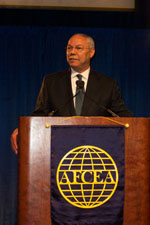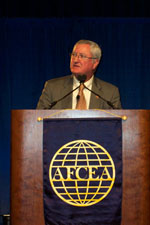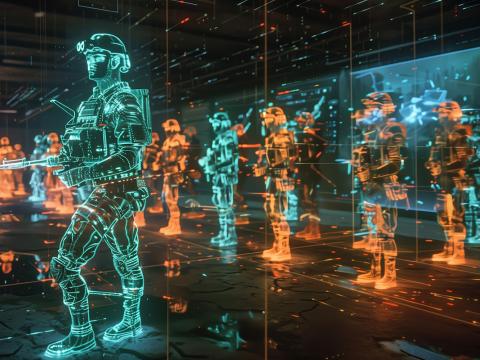Tuesday, June 20, 2006
SIGNAL’s
Online Show DailyTechNet International 2006
Day 2
Quote of the Day:
"The terrorists can knock down our buildings … they can kill our citizens … but they won’t win because they can’t change us as a society."
—Gen. Colin L. Powell, USA (Ret.), former secretary of state.
 |
Gen. Colin L. Powell, USA (Ret.), former secretary of state, kicks off day two of TechNet 2006 with a dynamic Tuesday plenary address. |
He cited some examples from his military and government careers as how information technology enabled him to get inside of a competitor’s or adversary’s decision cycle. This could be a key factor in defeating terrorism, he offered.
Gen. Powell offered some pointed remarks on Iraq. He said that Iraq will determine both the fate of the Bush presidency and the fate of U.S. foreign policy. He called for building up Iraqi forces quickly so that they can protect their own nation. However, equally important is that the civilian side of Iraq’s government also become established and powerful. This is essential so that the military side does not become dominant and lead the country into a military-dominated autocracy.
Above all, the next six months will be critical, and the United States must continue its involvement in rebuilding that country in the post-Saddam-Hussein era, the general offered.
"We are where we are, and we cannot walk away from the Iraqi people now," he said.
Afghanistan also is an important arena for U.S. involvement. Calling the Taliban regime the worst dictatorship in the world when it was brought down by U.S. forces, Gen. Powell stated that it is important that both the United States and NATO stay in Afghanistan. The Atlantic alliance shares many common beliefs with the United States—freedom, democracy, free-markets and the rights of individuals—and the two sides must continue to work together to further those values all over the world.
The general offered that the most important foreign policy challenge facing the United States is the issue of Israel and the Palestinians. If the United States can help broker an agreement that leads to a Palestinian nation living in peace with its neighbor Israel, most of the problems the United States faces in that part of the world will disappear along with much of the anti-Americanism elsewhere in the world.
Overall, Gen. Powell declared that he is optimistic about both current times and the future. He pointed out that in the past five years, as well as the past 15 years, have seen the creation of great new opportunities for the betterment of the world. The United States remains the trusted nation in most of the world, and there is no substitute for U.S. leadership. And, it remains the preferred destination of people around the world because of its vibrant society.
"I’m determined that the terrorists will lose because they will not change the nature of this great society," he declared.
 |
John F. Killian, president of Verizon Business, outlines an info-centric future at the TechNet 2006 Tuesday luncheon. |
He categorized key trends in global information technology process as "the four Cs." The first C, consolidation, involves erasing the boundaries of traditional information technology business definitions. Many companies, including Killian’s, are providing varied information services such as cable television and broadband Internet access. He noted that his company has placed its bets on "everything moving to IP [Internet protocol]—and we think that is a safe bet," he added.
The second C stands for convergence, which no longer is a theory or a prediction. It is gaining traction, especially with voice, data and video. This makes possible an intelligent network. The third C is connectivity, which involves anywhere, anytime access. This is especially important for the military, which requires mission-critical information on demand. Killian added that his company will invest $17 billion in networks.
The fourth C is collaboration, which Killian called the key to the future for both government and industry. Saying that partnerships drive action, Killian said that the two sectors need each other’s expertise to manage networks and the information infrastructure. The engines of change will continue, he added, and the future depends on collaboration and adjustment.
—Catch the SIGNAL Podcasts of the TechNet 2006 Multilevel Security panels at http://www.afcea.org/signal/podcasts.asp.




Comments